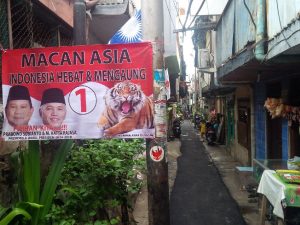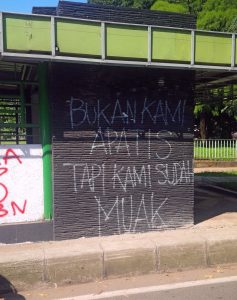Memo #311
Editor’s Note: On Friday, October 10, 2014, UBC’s Institute of Asian Research hosted a conference examining the theme, “The Jokowi Era: A New Age for Indonesia?” In advance of this gathering, one of its participants, Dr. Kai Ostwald, provided us his take on what the election of “Jokowi” signified for the world’s third largest democracy.
By Kai Ostwald – kai.ostwald [at] ubc.ca
 In a colorful and closely-fought election, Joko Widodo (commonly known as Jokowi) was elected to become Indonesia’s seventh president this past July. This has generated immense excitement, largely because Jokowi’s clean and technically-competent management approach, combined with his gift of the common touch, makes him distinct among political elites in the post-Suharto era. His victory at the ballot box, however, does not end the contentious battle over Indonesia’s democracy, and his reform agenda faces several potentially insurmountable challenges.
In a colorful and closely-fought election, Joko Widodo (commonly known as Jokowi) was elected to become Indonesia’s seventh president this past July. This has generated immense excitement, largely because Jokowi’s clean and technically-competent management approach, combined with his gift of the common touch, makes him distinct among political elites in the post-Suharto era. His victory at the ballot box, however, does not end the contentious battle over Indonesia’s democracy, and his reform agenda faces several potentially insurmountable challenges.
Commentators rightly suggested that Jokowi’s opponent, Prabowo Subianto, constituted a clear danger to Indonesia’s democratic system. The former general and son-in-law of autocrat Suharto made no secret of his nostalgia for “strong leadership” and his frustrations with the inefficiencies of democracy. Despite his defeat, Prabowo remains a key political figure, as he leads a six-party coalition that controls parliament with roughly 2/3rds of seats. He and his coalition partners appear fully committed not only to obstructing Jokowi’s agenda, but also to recentralizing political power in the legislature. This bodes ill for Jokowi, given that Indonesia’s presidency is already an institutionally weak position largely beholden to parliament. Prabowo’s machinations take more sinister forms as well: his coalition just orchestrated the passage of a bill that scraps direct elections for regional leaders, reverting Indonesia to the Suharto-era system where provincial governors, district chiefs, and mayors are appointed by the central government.
Furthermore, Jokowi faces opposition even from within his own party, as his preference for appointing technocrats to key positions runs counter to demands from allies for lucrative political appointments. Lastly, there are significant questions about how well Jokowi’s development strategy—based largely on his prior experiences leading two metropolitan areas—can tackle the structural problems of a country in which over 60% of the population remains in small-scale agriculture or the informal-sector.
The Jokowi era marks a clear departure from the Indonesian politics of old. Rightly, this has been greeted with enthusiasm from observers around the world. The leader of world’s third largest democracy, however, will not have the luxury of operating on his own terms, and this may bring to an abrupt end the expectations for extensive reform and renewed democratization.
About the Author:
Kai Ostwald is an assistant professor in the Institute of Asian Research and Department of Political Science, as well as the co-director of the Centre for Southeast Asia Research, at the University of British Columbia in Vancouver. His research interests cover ethnic politics, national identity, and other issues in domestic politics in Southeast Asia, particularly in Malaysia, Singapore, and Indonesia.
Links:
- E. Aspinall & M. Mietzner, “Prabowo Subianto: vote for me, but just the once”, New Mandala, 30 June 2014
- J. Chen, “Aftermath of Indonesia’s legislative elections: too many cooks spoil the broth,”RSIS Commentaries, Singapore: Nanyang Technological University (2014)
- J. Cochrane, “A Child of the Slum Rises as President of Indonesia,” New York Times, 22 July, 2014
- Hamish McDonald, “Democracy safe. Prosperity uncertain,” New Mandala, 1 October 2014
- Video: “Indonesia presidential election wrap up with Ed Aspinall and Ariel Heryanto” (ANU, August 2014):
Related Memos:
See our other memos on Indonesia.


Comments are closed, but trackbacks and pingbacks are open.